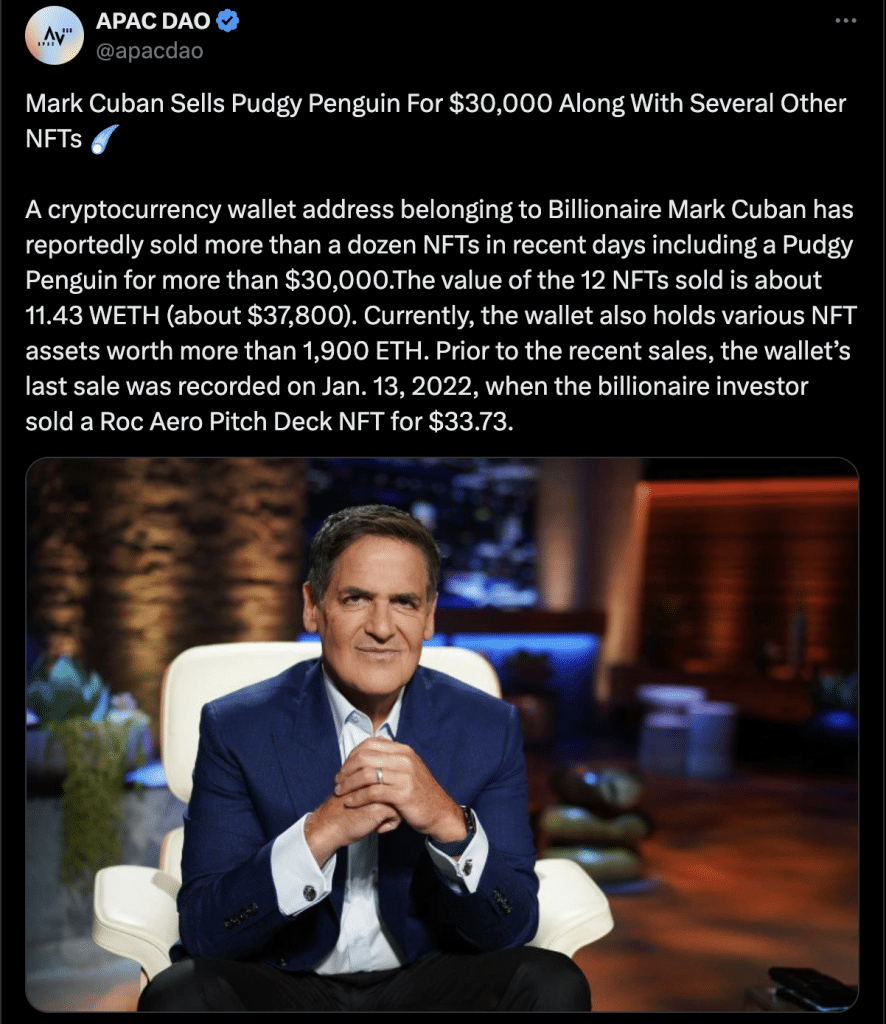Nfts
NFT Sales Dropped 44% During Cryptocurrency Market Crash, While Meme Coins Soared in Q2 2024
Meme coins have recorded a massive influx celebrity, sports, political and animal-themed meme coins in Q2 2024, despite the overall slowdown in the cryptocurrency market.
Notably, this broader downward trend in the cryptocurrency market has affected NFTs, with sales volume fall to $2.32 billion in the second quarter of 2024, down 44% from $4.14 billion in the first quarter.
This general market slowdown coincides with Bitcoin’s 15% decline from its March 14 all-time high of $73,750. Major altcoins have followed a similar trajectory, while memes appear to be unscathed.
Meme Coins Are Depriving the NFT Industry of Market Share
The rise of meme coins may have NFT sales affectedbecause it diverted investors’ attention share from the product. For context, attention share is the popularity of a particular product among consumers and investors.
As NFT sales decline, meme coins are now in the spotlight with their trading volume increasing. CoinGecko data reveals that meme coin trading volume reached $3.6 billion in the last 24 hours.
Most of the trading volume comes from PolitiFi meme coins, which have seen a surge in popularity in anticipation of the 2024 US presidential election. Additionally, the Solana and Ethereum networks have also seen a surge in new celebrity meme tokens.
Among the cryptocurrencies that saw significant price gains in the second quarter were the frog-themed cryptocurrency Pepe and the Donald Trump-linked MAGA (TRUMP) token. PEPE recorded new all-time highs in May, with the highest point of $0.00001718 reached on May 27.
Similarly, the price of MAGA skyrocketed following Trump’s pro-crypto statements during his campaign, reaching a new all-time high of $17.52 on June 1. MAGA is down nearly 63% from its new record.
Another meme coin that rose significantly in Q2 2024 was Gamestop GME, which hit an all-time high of $0.03207 on June 7 before dropping 75% to $0.0077.
Billionaire Mark Cuban’s Wallet Ditches NFTs After Two Years of Inactivity
Amid a decline in NFT sales, a cryptocurrency wallet linked to billionaire Mark Cuban, which has been inactive for nearly two years, has been selling a few NFTs. Its last sale before going inactive was on January 13, 2022, when Cuban sold a Roc Aero Pitch Deck NFT for $33.73.
However, the wallet address marked markcuban.eth recently sold Pudgy Penguin alongside others such as Euler Beats Genesis and Wrapped MoonCats.

In June, the billionaire sold around 14 NFTs worth an estimated $38,533. The Pudgy Penguin NFT, worth $39,578, is the most expensive NFT on his sales list. The most recent NFT sales ranged from $22 to $1,800.
In the meantime, the billionaire still plans to sell other high-value NFTs from his collection. He posted his NFT hashtag #MFFL, worth 15 Ether, for sale with an estimated value of $50,000.
Cuban also listed his Bible NFT, Deuteronomy 25:4, for 5 ETH (roughly $16,000). If he sells both NFTs, his total sales will increase to $100,000.
While the reason for Cuban’s NFT sales is unknown, it coincides with a security breach on his Gmail account. Cuban revealed that his Gmail account was compromised after he received a scam call. However, with the help of Google, Cuban recovered his account Gmail account June 25.
Additionally, Mark Cuban lost almost $900,000 to fraudsters in 2023. Thus, the recent NFT sales could likely be preventative measures. However, given the growing interest in Meme partsThe sales may have prompted other investors to dump their NFTs.
This is not the first time that such a drop in sales has occurred on the NFT market. Marker data reveals that NFTs saw a similar decline in 2023 before rebounding to record more than $3 billion in sales in the last quarter.
Disclaimer: The opinions expressed in this article do not constitute financial advice. We encourage readers to conduct their own research and determine their own risk tolerance before making any financial decisions. Cryptocurrency is a highly volatile and high-risk asset class.
The technical report editorial policy is focused on providing useful and accurate content that offers real value to our readers. We only work with experienced writers who have specific knowledge in the topics they cover, including the latest developments in technology, online privacy, cryptocurrencies, software, and more. Our editorial policy ensures that each topic is researched and curated by our in-house editors. We maintain rigorous journalistic standards and each article is 100% written by real authors.